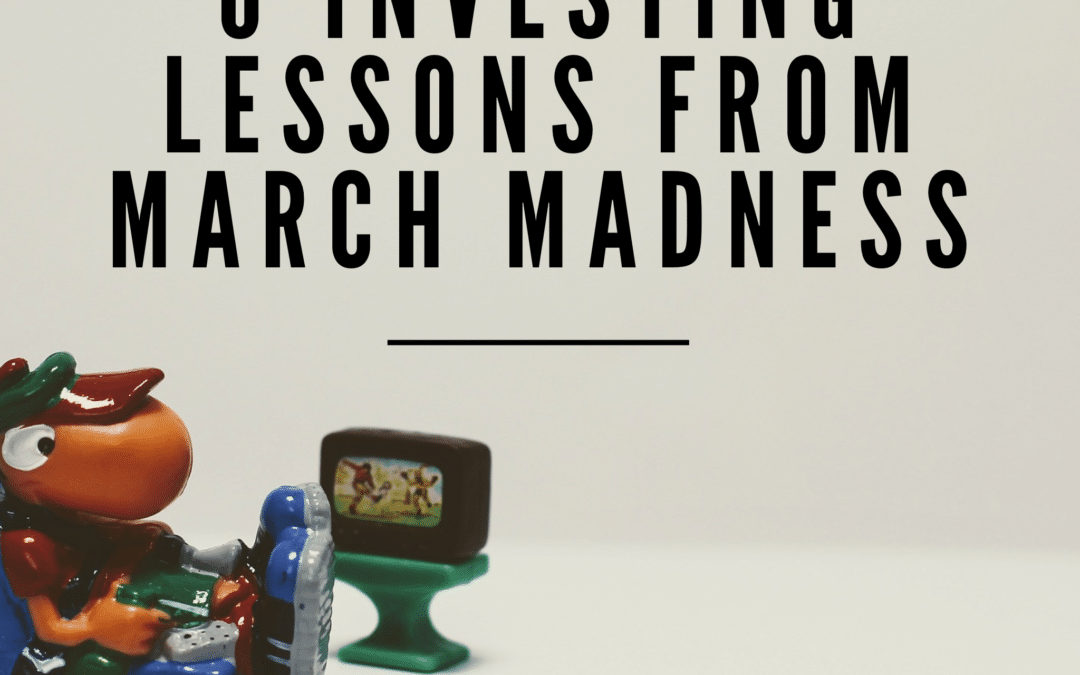Filling out a bracket for the NCAA basketball tournament reminds me so much of investing because it balances expertise, future expectations, risk, and reward. Winning also requires a healthy dose of luck along the way.
There are six lessons from March Madness we can apply to the world of investing.
1. The drama goes up the more you watch.
The more you watch the NCAA tournament, the more emotional you become about the outcomes. Watching the drama of March Madness is a great form of entertainment, but watching the market closely rarely helps investors.
Myopic loss aversion tells us that the more you watch the markets, the more susceptible you become to making poor investment decisions. The best investors stay as detached as possible from daily stock fluctuations.
2. It’s not about being perfect, but positioning yourself to get the most right.
The odds of filling out the perfect bracket are 1 in 9,223,372,036,852,775,808. It’s unrealistic to expect to come close to having a perfect entry.
For investors, there is no such thing as the perfect portfolio. No strategy works 100% of the time. Long-term investors should simplify the game and worry about things they can control like asset allocation, investment costs, and minimizing taxes.
3. Past performance guarantees nothing about the future.
It is easy to let a team’s past success influence your bracket picks, but last year’s tournament was last year’s tournament. Similarly, investors should never assume that the best performing asset class, sector, country, or stock from a year ago will have a repeat performance.
The same goes for picking fund managers; it is quite common to see funds that have outperformed in a given period proceed to underperform in the subsequent period.
4. Success requires removing biases from your decision making process.
I always pick a #10 seed to upset a #7 seed or a #12 seed to beat a #5 seed based on my perceived frequency of that type of first round upset occurring in the past. People have a tendency to pick their alma mater or a local school to advance further than what evidence and probability suggest.
Success in March Madness and investing requires a decision making process that protects us from our faulty mental hardwiring that causes us to misinterpret (or ignore entirely) probabilities, find patterns where none exist, and elicit emotional responses.
5. People remember their successes and forget their failures.
People love to talk about their bracket when they are doing well. You will hear about all of the upsets they picked and how many teams they correctly advanced to the Final Four. Many of these same people will share their success through the lens of skill rather than luck.
Conversations on investing in social situations are fairly similar. You always hear people talking at social gatherings about their investment successes, but you never hear about anyone’s failures.
6. Luck plays a bigger role than ever.
There are more resources than ever to help fans fill out their brackets, which has decreased the importance of college basketball knowledge and increased the importance of luck.
The paradox of skill is evident in the investment world, too. Outsmarting the collective knowledge of financial markets is increasingly difficult given the better dissemination of information, significant advances in technology, and profits attracting the best and brightest talent to financial firms. The end result is less dispersion in skill and more reliance on luck for favorable outcomes.















You should share your own bracket and let us know how your brackets performed in the past.
Haha, my past successes and failures are entirely driven by luck. Since you asked, the CBS Sports website let’s me view historical standings going back to 2011, which has the number of games you correctly predicted. That doesn’t really get you what you are looking for, but it’s the best I can do. 2011 – 33, 2012 – 35, 2013 – 37, 2014 – 37, 2015 – 44, 2016- 41. In 2017, I’m 36/48 after two rounds.